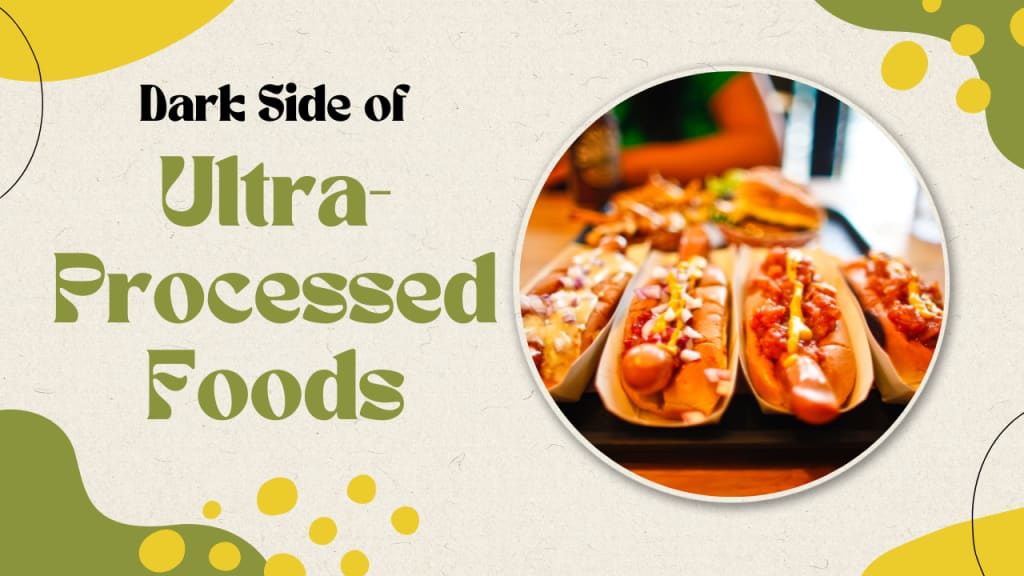The Dark Side of Ultra-Processed Foods: What You Need to Know?
Learn about the dangers and harmful effects of ultra-processed foods on our health and why it's important to reduce their consumption. Find tips on how to make healthier food choices.

Ultra-processed foods have become a staple in our diets, but at what cost to our health? These highly processed and often convenient foods are loaded with unhealthy ingredients and additives, making them a major contributor to the growing health crisis. In this article, we'll explore the dangers of ultra-processed foods and what you can do to reduce your intake and make healthier food choices.
What are Ultra-Processed Foods?
Ultra-processed foods are those that have been heavily processed and contain a long list of ingredients, many of which are unhealthy additives, preservatives, and artificial flavors. These foods include instant noodles, frozen dinners, soft drinks, sugary snacks, and processed meats. They are often high in calories, salt, sugar, and unhealthy fats and lack the essential nutrients found in whole foods.
The Dangers of Ultra-Processed Foods
Increased Risk of Chronic Diseases
Studies have linked the consumption of ultra-processed foods with a higher risk of chronic diseases, such as heart disease, type 2 diabetes, and certain types of cancer. This is due to their high content of unhealthy ingredients, such as trans fats, added sugars, and artificial preservatives.
Weight Gain
Ultra-processed foods are often high in calories and low in fiber, making them easy to overeat. This can lead to weight gain, which can increase the risk of chronic diseases.
Decreased Nutrient Absorption
The processing of ultra-processed foods often destroys essential vitamins and minerals, reducing their nutrient value. Additionally, the unhealthy ingredients used in these foods can interfere with the absorption of nutrients from other foods, leading to a lack of important nutrients in the diet.
Tips for Reducing Ultra-Processed Food Intake
Shop the Perimeter
When shopping for groceries, focus on buying whole foods found on the perimeter of the store, such as fresh fruits and vegetables, whole grains, and lean proteins. These foods are typically less processed and contain fewer unhealthy additives.
Cook at Home
Cooking at home allows you to control the ingredients and preparation of your food, reducing your exposure to unhealthy additives and preservatives.
Read Labels
Become a label detective and read the ingredient list of the foods you buy. Avoid foods that contain a long list of ingredients, particularly unhealthy additives, preservatives, and artificial flavors.
Choose Whole Foods
Choose whole foods, such as fresh fruits and vegetables, whole grains, and lean proteins, over processed foods. These foods are typically lower in calories and unhealthy ingredients and higher in essential nutrients.
FAQs on Ultra-Processed Foods
Q: What is the definition of ultra-processed foods?
A: Ultra-processed foods are those that have been heavily processed and contain a long list of ingredients, many of which are unhealthy additives, preservatives, and artificial flavors.
Q: What are the dangers of consuming ultra-processed foods?
A: The consumption of ultra-processed foods has been linked to a higher risk of chronic diseases, such as heart disease, type 2 diabetes, and certain types of cancer. They are also often high in calories and unhealthy ingredients, leading to weight gain and decreased nutrient absorption.
Q: How can I reduce my intake of ultra-processed foods?
A: You can reduce your intake of ultra-processed foods by shopping the perimeter of the store for whole foods, cooking at home, reading food labels, and choosing whole foods over processed options.
Conclusion
Ultra-processed foods have become a staple in our diets, but they come with significant health risks. By understanding the dangers of these foods and making healthier choices, we can reduce our exposure to unhealthy additives and preservatives and improve our overall health. So next time you reach for that convenient snack or meal, take a moment to consider the ingredients and opt for a healthier, whole food alternative. Your body will thank you!





Comments
There are no comments for this story
Be the first to respond and start the conversation.